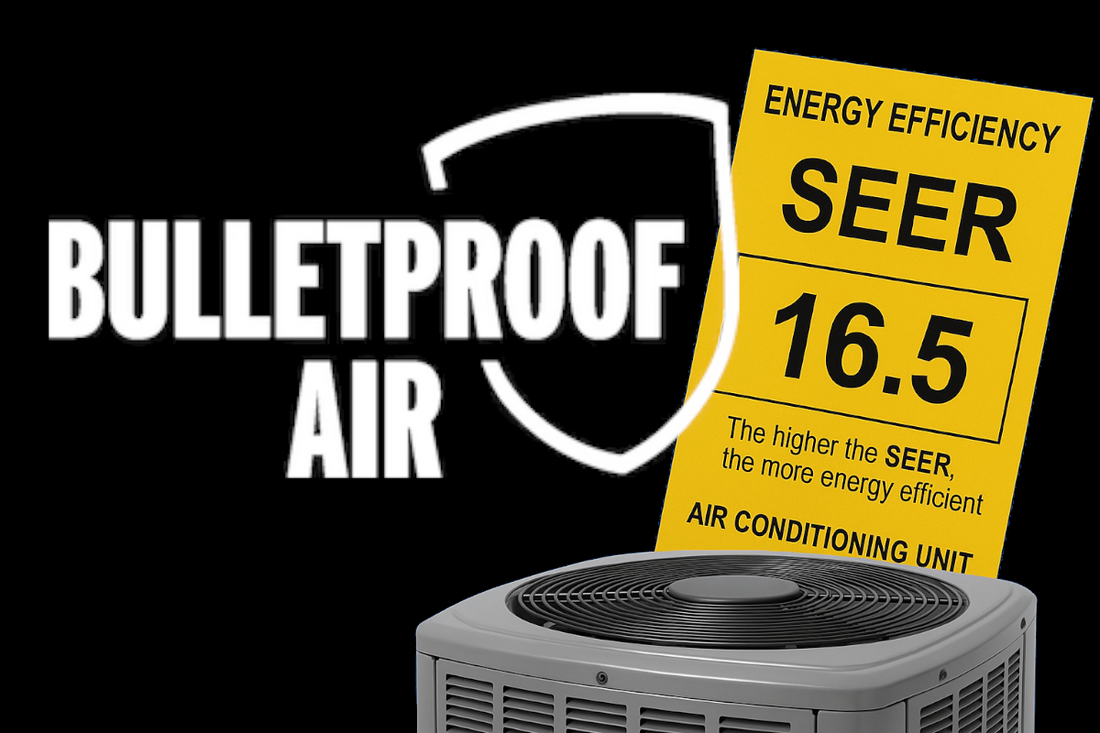
Understanding SEER Ratings: How They Affect Your AC System
Understanding SEER Ratings: How They Affect Your Air Conditioning System
When it comes to keeping your home cool during the scorching summer months, most people think about two things: comfort and cost. But have you ever noticed the term “SEER” when shopping for an air conditioning system? SEER stands for Seasonal Energy Efficiency Ratio, and while it may sound technical, understanding it can actually help you make smarter choices for your home comfort—and your wallet.
At BulletProof Air, we believe that every homeowner deserves to feel confident about their air conditioning decisions. That’s why we’re breaking down SEER ratings in simple, approachable terms.
What is a SEER Rating?
Simply put, a SEER rating is a measure of how efficiently an air conditioning system operates over an entire cooling season. Think of it as a miles-per-gallon rating, but for your AC. The higher the SEER rating, the more cooling you get for each unit of electricity you use.
For example:
- A system with a SEER rating of 13 is considered standard for most homes today.
- A system with a SEER rating of 21 or higher is considered highly efficient, meaning it uses significantly less energy to keep your home cool.
At BulletProof Air, we help homeowners choose the right SEER rating for their home, balancing comfort, energy savings, and cost. Our experts ensure you get the best system for your unique needs.
Why SEER Ratings Matter
SEER ratings are more than just a number on a sticker—they have a real impact on both your energy bills and your comfort.
1. Energy Efficiency Saves Money
Higher SEER ratings generally mean lower electricity bills. While a high-SEER system may cost more upfront, it pays off over time with reduced energy consumption. In regions with long, hot summers, the savings can be significant.
2. Environmental Impact
Using less electricity doesn’t just save money—it also reduces your carbon footprint. Choosing a high-SEER system is one way to make your home more eco-friendly without sacrificing comfort.
3. Comfort and Performance
High-efficiency AC systems often provide better temperature control and more consistent cooling. They can run longer cycles at lower power, which not only keeps your home comfortable but can also help reduce wear and tear on the system.
How SEER Ratings Affect Your AC System
You might wonder, “Does a higher SEER mean my AC is stronger?” Not exactly. SEER ratings measure efficiency, not raw cooling power. Here’s what changes with higher or lower SEER systems:
- Lower SEER (13-16): Reliable systems that do a solid job of cooling your home but consume more energy. They may cycle on and off more frequently, causing minor temperature fluctuations.
- Mid-range SEER (17-20): Strike a balance between energy savings and upfront cost. Quieter and more energy-efficient than standard systems.
- High SEER (21+): Maximize efficiency, use less electricity, and often include features like variable-speed compressors for smoother, more consistent cooling.
With guidance from BulletProof Air, you can choose the SEER rating that fits your lifestyle and budget. Our team explains these options in simple terms so you can make an informed decision.
Factors to Consider When Choosing a SEER Rating
Choosing the right SEER rating isn’t just about picking the highest number. A few key factors should guide your decision:
1. Local Climate
If you live in a region with long, hot summers, a higher SEER system can offer bigger savings. In cooler climates, the benefit may be less dramatic.
2. Home Size and Insulation
A larger home or one with poor insulation may require a more powerful AC system. The SEER rating can help reduce energy usage, but proper sizing and installation are crucial for efficiency and comfort.
3. Budget
Higher SEER systems cost more upfront, so consider your long-term energy savings versus initial investment. Sometimes a mid-range SEER system offers the best value for your home.
4. Energy Rebates
Many energy providers offer rebates for high-efficiency AC systems. A higher SEER rating might qualify you for these savings, which can offset the initial cost.
SEER Ratings and Your Wallet
Let’s break it down in practical terms: a system with a higher SEER rating might cost $1,500–$3,000 more upfront than a standard model. However, it could save hundreds of dollars annually on electricity bills. Over a typical 10-15 year lifespan, that adds up to a significant return on investment.
At BulletProof Air, we provide transparent estimates that show you both upfront costs and long-term savings. That way, you can choose the right system with confidence.
Installation Matters
Even the highest-SEER system can underperform if it’s not installed correctly. Professional installation ensures your AC runs efficiently, maintains consistent cooling, and lasts for years. That’s why trusting a company like BulletProof Air matters: we combine top-notch equipment with expert installation to get the best results for your home.
The Takeaway
SEER ratings are a simple way to measure the efficiency of your air conditioning system. While the numbers might seem technical, their impact is very real: lower energy bills, better comfort, and a greener home.
When choosing your next AC system, consider your climate, home size, budget, and potential energy savings. And remember, installation quality is just as important as the SEER rating itself. With the right system and professional support from BulletProof Air, you can enjoy a cool, comfortable home all summer long—without worrying about sky-high electricity bills.
Investing in a high-efficiency AC system isn’t just about staying cool. It’s about making your home smarter, more comfortable, and more economical. With a better understanding of SEER ratings, and guidance from BulletProof Air, you’re empowered to make a choice that fits your needs—both today and for years to come.
Contact Us today for expert local expertise and professional service | Call 941.599.9999
If you would like maintenance or repair assistance with your Florida Air Conditioner, contact BulletProof Air Or call: 941.599.9999 for more information about how we can help.
